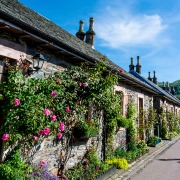FAQs about Wild English
What about Covid?
We cancelled the 2021-2025 summer schools because of Covid-19 (the SARS-CoV-2 coronavirus) and new Brexit rules. Send us a "hello" email or complete an enquiry form, and we will tell you about summer 2026 when we know.
What about Brexit?
Brexit: New UK rules from 2021 say that you can't come to the UK if the purpose of your visit is to study English with an independent teacher like me. This is part of Brexit. I'm sure these new rules will soon change. If you come to the UK for any other purpose, such as tourism, you can do recreational study during your visit. However, there will be no Wild English summer school in 2025. Click here for more on Brexit.
-
Is Wild English for everybody?

Wild English is for everybody who is over 18 and interested in nature. Most people on Planet Earth today have never seen a wild animal, except wild birds or zoo animals. That's a good reason for coming to the west coast of Scotland.
You will understand the lesson themes, because each evening you do an hour of preparation for the next day.
Expert naturalists are also very welcome. We can include lessons specifically for your professional needs. For example, speaking and writing using scientific vocabulary. That includes writing articles for scientific journals. Articles proof-read by Nicholas have appeared in half a dozen peer-reviewed international journals.
-
How many lessons are there per week?

There are lessons every day from Monday to Friday:
• 2 hours per day of grammar, vocabulary and pronunciation.
• 3 hours per day of English communication using practical skills and citizen science.
-
How big are the classes?

The maximum student-teacher ratio is 8 students to 1 teacher.
- Where do Summer School students stay?
-
Can my children come too?

Your children are very welcome to accompany you to the Wild English Summer School, but they can't come unaccompanied until they're 18.
If they want to study English with us, the weekly tariff is the same for everybody.
If they don't want to study English, there is no tuition fee, and they are still welcome to accompany us for trips to the beach or the woods - if there are enough seats that day in the school's 9-seater minibus.
Let us know when you want to come, and we can tell you what family accommodation is available. -
What animals will we see?
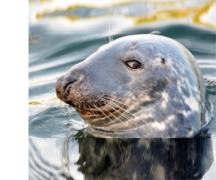
It's a long list. The Scottish "Big 5 Species" are the red squirrel, the red deer, the golden eagle, the otter and the harbour seal. The red squirrel has never done the 2-km swim to Mull, but Mull has something even better - the white-tailed eagle (Haliaeetus albicilla). We will almost certainly do some seal-watching, you're likely to see red deer and golden eagles, and there's a reasonable chance you'll see an otter, but they are shy and unpredictable. Mull has buzzards, hen harriers, short-eared owls, barn owls, herons, skylarks, ringed plovers, oystercatchers, gulls, arctic terns, sea ducks, divers and many more.
Of course, Wild English is mainly a language course. If you really, really want to see white-tailed eagles, puffins, dolphins or whales, contact one of Mull's eco-tourism operators for a weekend expedition in a Land Rover or a boat. See Wolf Island, Isle of Mull.
-
How do we do marine research?
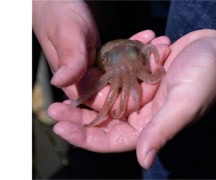
On foot, in the littoral or intertidal zone. In other words, we go on the beach and around the rocks at low tide.
The vertical difference between high tide and low tide is called the 'tidal range'. The tidal range on the Isle of Mull is up to 4.89 metres. That means there's a lot of exposed intertidal environment at low tide.
-
Summer School: Is it very physical?
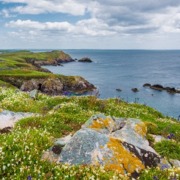
No, but we spend half the day on the beach, on rocky shores, in the forest, by rivers, etc.
Also, we have to walk there from the minibus.You should be able to walk 4 kilometres, including some rough and steep ground.
-
Summer School: Do I need any special equipment?

A computer, for homework and preparation;
and an English dictionary. Preferably a paper one, not too big, not too small.And maybe a 25-litre to 35-litre rucksack for your drink, notebook, camera, jacket and sunscreen.
Some people like to carry a lightweight monocular. For example, the Viking 8x42 ED-M monocular. It's not cheap, but the big 42mm objective lens and the low dispersion ED glass give a very bright, clear image for the price.
-
Summer School: What should I wear?
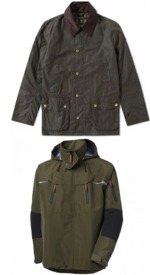 For rainy days:
For rainy days:
(1) A waterproof coat/jacket with a hood.
Naturalists and hunters often wear waxed cotton jackets by Barbour or Belstaff. They're very quiet, so the animals won't hear you. Also, cotton doesn't melt if you get too close to a beach barbecue.Hikers, walkers and mountaineers usually wear Gore-Tex, which is lighter, smarter and keeps you very dry.
Wear whatever makes you feel comfortable.
(2) Walking trousers.
Hiking trousers made of thin, close-weave polycotton (polyester-cotton mix) are good. Craghoppers, for example.But not denim jeans (Levis, Wranglers, Diesel, Lee, etc), especially if they're tight.
-
Summer School: What about footwear?
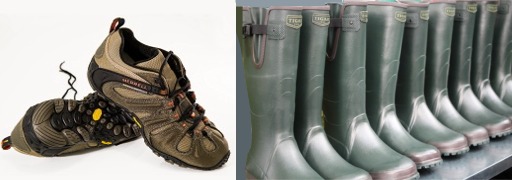
For dry places, lightweight hiking shoes by Salomon, Scarpa, Regatta, Trespass, The North Face, Merrell or Hi-Tec are good.
For wet places, tall rubber boots ("wellington boots") are very good.
We'll give you a pair of wellington boots when you arrive. -
What about walking boots and trekking poles?
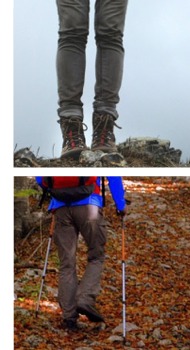
Short answer: You don't need walking boots or poles for Summer School, but a lot of visitors to the island like to use them. If you like them, use them.
Long answer: Leather doesn't like salt water. Also, walking boots weigh nearly twice as much as walking shoes, and they're pretty warm, so I don't wear them in summer. There's no evidence that the ankle support you get from walking boots reduces the number of "sprained ankle" injuries.
However, a nice pair of hiking boots is very comfortable on rough ground, especially if it's a cold, wet winter day. Boots by a reputable manufacturer like Scarpa, Salomon or Meindl have excellent grip, and they'll keep your feet warm when they're soaking wet, especially if you use them with gaiters. You don't feel any discomfort if you stand on a sharp rock. The padded uppers protect your ankles from cuts and scratches, but they're not so high that they prevent free movement of the ankles when walking.
Trekking poles weigh 500-600 grammes per pair, they're inconvenient if you need to climb over a stile or find your camera, and it's easy to trip over one of your poles, but they are great if you are carrying a heavy load (25-30 kg) in a big rucksack. (I only do that if I really, really have to!)
-
Travel to Summer School: How do I get there?

You get to the Isle of Mull, and we collect you from the ferry. Click here for details.
-
Do people in Scotland speak standard English?
Yes, they do. People on the Isle of Mull have a nice, gentle accent.
There are lots of Scottish accents in Hollywood, including those of Ewan McGregor (The Island), Gerard Butler (Beowulf and Grendel), James McAvoy (X-Men) and Sean Connery. And Shrek, too.
-
After Brexit: Do I need a passport? Or a visa?
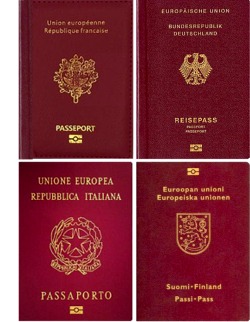
I am an independent English teacher; I can't give you advice about visas and immigration, so please check the facts on the UK Visas & Immigration website at www.gov.uk/check-uk-visa:
The United Kingdom (the UK) is England, Wales, Scotland and Northern Ireland.
The Brexit transition period ended on 31.12.2020. The UK is now not a part of the European Union.
UK citizen: If you are a UK citizen you have a free choice of English teacher in the UK.
European Union, EEA or Swiss citizen: If you are from the EU, Iceland, Norway, Liechtenstein or Switzerland, you can enter the UK for up to 6 months without a visa IF the purpose of your visit is for tourism or to visit family, or to do a short course on history or culture; or on the Welsh, Gaelic or Anglo-Saxon languages; or to learn rock-climbing, golf or yoga. However, at present you CANNOT enter the UK if the purpose of your visit is to do a short English course UNLESS you intend to study at an accredited institution such as a university. I am not an "accredited institution".
Hong Kong citizen: If you have a Hong Kong passport, you are in the same position as a European Union citizen - see above. If you have Hong Kong travel papers (not an HK passport), see below.
Other countries: If you are not a citizen of the UK, an EU state, Iceland, Norway, Liechtenstein or Switzerland, you probably need a visa to enter the UK. As an independent English teacher, I cannot sponsor you to obtain a study visa. If you enter the UK on a standard visa, you cannot study except for short recreational courses (dance, sport, etc). -
What about insurance?
Please make sure your things (camera, mobile phone, passport, jewellery, etc) are covered by your own insurance against loss, damage or theft. They may already be covered by your house insurance. If not, you can get travel insurance for lost property and medical expenses.
Please do not expect your things to be covered by our insurance or by a homestay family's insurance.
-
What about healthcare?
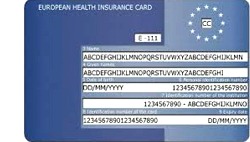
You may want to get travel insurance to cover medical expenses as well as lost property.
Emergency treatment is usually free in the UK, but if you are from the European Union you should get a European Health Insurance Card before you travel. Also called an EHIC or E111, the card is free from your own government. Keep it with your passport. The EHIC is valid in Scotland until the end of the Brexit transition period on 31.12.2020.
In Britain, the National Health Service (NHS) gives you free healthcare in public hospitals and with NHS family doctors if you have an E111.
Why get travel insurance for medical expenses? Not all healthcare is free with an E111. There is usually a charge for medication, you have to pay for most dental treatment, and the E111 does not pay for medical repatriation if you are injured or ill and need to go home urgently.
In other languages, an E111 is a Carte européenne d'assurance maladie, Tarjeta Sanitaria Europea, Tessera europea di assicurazione malattia, Auslandskrankenschein, Europese gezondheidskaart, Euruopas svēkatas draudėma kuortelė, Europejska Karta Ubezpieczenia Zdrowotnego, Evropský průkaz zdravotního pojištění, Europeisk helsetrygdkort, Europeiska sjukförsäkringskortet, Eurooppalainen sairaanhoitokortti, Eiropas veselības apdrošināšanas karte, Európai Egészségbiztosítási Kártya.
- Contractual terms & conditions

